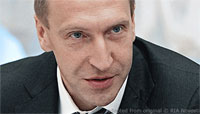Deputy Prime Minister Shuvalov Sees Hard Landing for Russia

(Bloomberg – bloomberg.com – Olga Tanas, Ott Ummelas, Anna Andrianova – January 23, 2015) Russia is in an “extremely difficult” economic situation and faces a worse crisis than in 2008-2009, according to First Deputy Prime Minister Igor Shuvalov.
The country must prepare for a hard landing, Shuvalov said at a breakfast organized by the nation’s biggest lender, OAO Sberbank (SBER), on Friday in Davos, Switzerland. While there’s no chance of a quick political solution to the Ukrainian crisis, sanctions imposed by the U.S. and its allies have consolidated popular support behind President Vladimir Putin, he said.
The world’s largest energy exporter is sliding into its first recession since 2009 and may be stripped of its investment-grade rating for the the first time in more than a decade. The effect of slumping oil prices has been compounded by the sanctions introduced over Putin’s actions in Ukraine, where he denies his nation is interfering in the 10-month conflict.
“On the face of it, we’re getting indications that it’s better than in 2008-2009,” Shuvalov said. “But this only seems so. In fact, in terms of depth and difficulty, it looks to me like we’ve already spent a year on the verge of a longer and more difficult crisis.”
Russia’s economy has grown every year since output plunged 7.8 percent in 2009, when oil prices tumbled to less than $40 per barrel amid the global financial crisis and the ruble sank by about a third. The currency is down 47 percent against the dollar in the past 12 months.
Social Payments
To temper the effects of the unfolding crisis, the government needs to allocate funds to cover social benefits if unemployment rises, Russian Prime Minister Dmitry Medvedev told a meeting with ministers Thursday in Moscow, ordering the cabinet to accelerate work on an anti-crisis plan.
The cost of the program is estimated at 1.4 trillion rubles ($22 billion) and its size may be expanded, Shuvalov said Wednesday in Moscow. The government will support key enterprises, small businesses and monitor consumer prices on sensitive items.
The central bank’s worst-case economic scenario published Dec. 15 envisioned oil prices averaging $60 a barrel until the end of 2017. Under such conditions, it forecast the Russian economy may contract as much as 4.7 percent next year and 0.9 to 1.1 percent in 2016.
Putin vowed last month to guide the nation through the turbulence in the same way he steered Russia through the 2008 financial crisis, warning citizens to brace for a recession and criticizing the central bank for not responding faster.
Cash Flees
Capital outflows from Russia, which more than doubled to $151.5 billion in 2014, may be $90 billion to $100 billion this year, former Finance Minister Alexei Kudrin said at the same event in Davos. The central bank predicted last month that outflows may decline to $115 billion to $120 billion in 2015. Fitch Ratings, which downgraded Russia to its lowest investment grade this month, sees 2015 outflows at $130 billion.
Moody’s Investors Service on Jan. 16 lowered Russia’s credit rating to Baa3, one step above junk. Standard & Poor’s said Jan. 16 that it will decide whether to cut Russia to junk by the end of January.
Article ©2015 Bloomberg L.P. All Rights Reserved. Article also appeared at bloomberg.com/news/2015-01-23/shuvalov-sees-hard-landing-in-russia-as-crisis-to-surpass-2009.html
[featured image is file photo]
